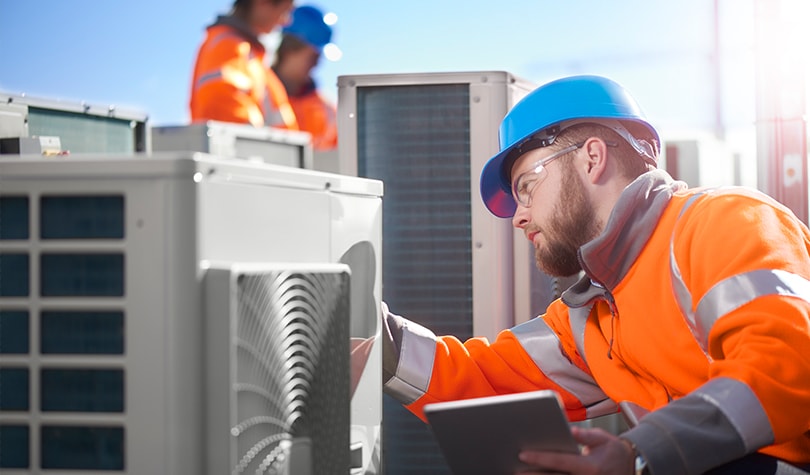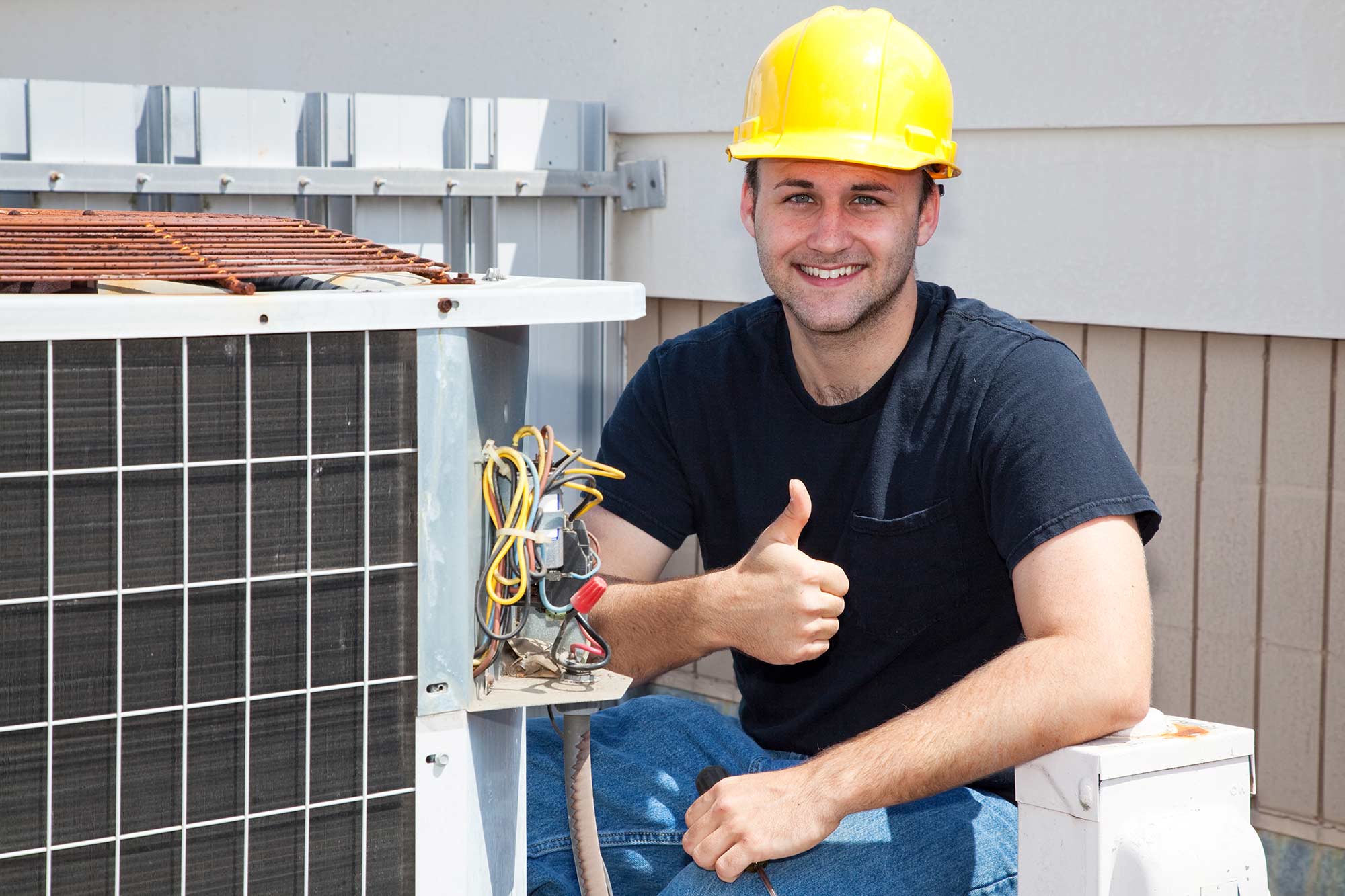How an AC repairman diagnoses unusual noises
The Value of Heating And Cooling Knowledge: Revealing Root Causes Of AC Troubles for Homeowners
Property owners typically forget the relevance of comprehending their heating and cooling systems. Identifying typical indicators of cooling issues can result in timely interventions. Concerns like insufficient cooling or unusual sounds are not just inconveniences; they can indicate deeper issues. By exploring the source of these problems, property owners can improve system performance and expand its life-span. What are the most prevalent concerns that can develop, and how can they be effectively resolved?
Usual Indicators of Air Conditioner Issues
Just how can house owners determine problems with their cooling systems prior to they escalate? Identifying common indications of air conditioner issues is important for prompt upkeep. One common indication is insufficient cooling; if the cooling unit fails to reduce the interior temperature level, it might signify underlying issues. Unusual sounds, such as grinding or hissing, can also indicate mechanical failings or loose components - AC repairman. Additionally, homeowners ought to watch out for strange smells rising from the device, which might suggest mold development or electric issues. Constant cycling on and off, referred to as short biking, can show thermostat issues or cooling agent leaks. In addition, an increase in energy expenses without a matching rise in usage might indicate inadequacy. By remaining sharp to these warning indicators, homeowners can stop a lot more substantial concerns and expensive repair work, ensuring their a/c systems run successfully throughout the warmer months

Understanding Refrigerant Issues
Refrigerant concerns can substantially influence the performance of a cooling and heating system. Property owners ought to understand the indications of low refrigerant degrees and the importance of identifying cooling agent leaks. Resolving these problems immediately can prevent more damage to the system and guarantee optimal cooling down efficiency.
Low Cooling Agent Levels
A common concern that property owners may run into with their cooling and heating systems is low cooling agent levels, which can substantially affect the system's effectiveness and performance. Refrigerant is essential for the cooling procedure, absorbing heat from interior air and launching it outside. When degrees drop, the a/c unit battles to cool the area effectively, resulting in boosted energy intake and possible system strain. Symptoms of low refrigerant consist of inadequate cooling, longer run times, and ice formation on the evaporator coils. House owners may likewise see uncommon sounds as the compressor functions harder to make up for the shortage. It is essential for house owners to recognize the value of keeping proper cooling agent levels to assure peak a/c performance and longevity.
Refrigerant Leaks Detection
Where might a property owner start when encountered with the opportunity of cooling agent leaks in their heating and cooling system? The primary step involves keeping track of the system's performance. Indicators such as reduced cooling down effectiveness, ice formation on coils, or hissing noises may show a refrigerant leak. Homeowners ought to likewise examine for noticeable signs of oil residue, frequently an indication of a leak. Making use of a refrigerant leak detector can supply even more precise recognition. If suspicions linger, getting in touch with a qualified cooling and heating professional is important, as they possess the know-how and tools to situate leaks successfully. Trigger detection and repair service of refrigerant leakages not only enhance system performance but additionally stop potential environmental injury, making it a necessary aspect of cooling and heating maintenance.
Electrical Failures and Their Impact
Electrical failures can considerably impact HVAC systems, specifically via concerns like circuit breaker malfunctions and damaged electrical wiring. These troubles not only interfere with the system's performance but can also result in costly repair work and safety and security hazards. Recognizing the ramifications of such failings is essential for home owners to preserve an efficient and safe a/c setting.
Breaker Issues
How can breaker problems influence the effectiveness of an a/c system? Circuit breakers offer as critical security devices that take care of electric flow to heating and cooling systems. If a breaker trips often, it interferes with power supply, leading to irregular heating or air conditioning. This can create substantial pressure on the system, causing ineffective operation and potential damage to components. House owners might notice increased power costs as a result of the HVAC system's battle to maintain preferred temperatures. In addition, duplicated interruptions from tripped breakers can shorten the lifespan of the air conditioner device, needing pricey fixings or replacements. Regular maintenance of breaker is essential, as it assures a steady power supply, inevitably improving the overall performance of the cooling and heating system.
Faulty Circuitry Effects
Often overlooked, faulty wiring can have alarming repercussions for HVAC systems. Electrical wiring problems might Go Here lead to brief circuits, resulting in constant malfunctions and enhanced repair expenses. Furthermore, inappropriate wiring can cause inefficient energy use, leading to higher utility bills and strain on the system. In severe situations, faulty wiring can cause electrical fires, posturing a significant security danger to property owners. These electric failings can damage A/c components, resulting in expensive substitutes or considerable repair work. Property owners must focus on normal assessments by certified experts to identify and correct circuitry issues before they escalate. Recognizing the effects of defective electrical wiring can assist assure the durability and safety of cooling and heating systems, inevitably safeguarding both the home and its passengers.
Clogged Filters and Their Consequences
While several home owners might overlook the significance of normal filter maintenance, clogged filters can result in significant effects for HVAC systems. When filters become blocked with dirt, dust, and debris, airflow is restricted. This reduction in air movement forces the system to work harder, resulting in raised power usage and possibly greater utility costs. Over time, this pressure can create wear and tear on parts, resulting in early system failure.
In addition, clogged up filters can compromise indoor air quality. Toxins and irritants might distribute throughout the home, exacerbating respiratory issues and allergic reactions for residents. Insufficient air flow can cause the evaporator coil to ice up, leading to pricey fixings and ineffective air conditioning efficiency. Consistently changing or cleaning up filters is a basic yet vital upkeep job that can aid guarantee the long life and performance of HVAC systems, eventually benefiting both the homeowner's convenience and their financial resources.

Thermostat Malfunctions Explained
What happens when a thermostat breakdowns can greatly affect both comfort and power efficiency in a home (ac unit replacement). A damaged thermostat may fail to precisely review the temperature level, bring about overcooling or not enough cooling. This discrepancy can cause discomfort for residents and lead to greater power costs, as the cooling and heating system works more challenging than essential
Typical concerns consist of dead batteries, which can render electronic thermostats defective, and loose wiring that interferes with communication between the thermostat and the cooling and heating system. Furthermore, outdated or poorly adjusted thermostats may not respond correctly to temperature modifications, additionally exacerbating power inadequacy.
Homeowners should be cautious for indications of breakdown, such as inconsistent temperatures or unanticipated power expenses. Regular checks and understanding of the thermostat's capability can assist recognize troubles early, ensuring peak efficiency of the cooling and heating system. Addressing thermostat issues immediately useful link is vital for keeping a comfortable living atmosphere and managing energy consumption effectively.
The Function of Normal Maintenance
Regular maintenance plays a vital role in guaranteeing the longevity and efficiency of a/c systems. Home owners that focus on routine checks can protect against minor problems from escalating into costly repair services. Routine upkeep generally includes tasks such as cleaning filters, examining ductwork, and inspecting refrigerant degrees. These activities assist maintain ideal air flow and system performance, decreasing energy usage.
In addition, a properly maintained HVAC system operates extra successfully, supplying regular comfort throughout the home. Regular tune-ups can additionally prolong the life-span of the unit, leading to substantial savings with time. Homeowners are motivated to set up professional inspections at the very least when a year to identify possible issues early.
Additionally, several suppliers call for normal upkeep to maintain warranties, making this technique not only valuable yet frequently necessary. In general, understanding the relevance of regular maintenance empowers home owners to secure their heating and cooling systems against unanticipated failures and enhance their financial investment in home convenience.
Often Asked Questions
How Can I Improve My Ac's Power Performance?
Improving an air conditioner's power efficiency involves routine maintenance, cleansing or replacing filters, sealing ductwork, making sure proper insulation, making use of programmable thermostats, and organizing specialist evaluations to recognize and fix prospective issues impacting efficiency.
What Is the Lifespan of a Typical Air Conditioning Device?
A regular a/c system has visit a lifespan of 15 to twenty years, depending on upkeep, use, and ecological factors. Routine maintenance can significantly expand its operational life and boost total performance.
When Should I Change My Cooling System?
An air conditioning system should generally be changed every 10 to 15 years. Indicators for substitute include constant repair work, increasing power bills, and not enough air conditioning, showing that an upgrade may be extra economical and reliable.
Can I Fix Air Conditioning Problems Myself?
Yes, people can troubleshoot AC problems themselves by examining filters, guaranteeing power supply, and evaluating for visible issues (HVAC contractor). Nonetheless, complex problems usually call for specialist support for accurate medical diagnosis and risk-free repair, guaranteeing optimal system performance
Just how Do I Select a Reliable A/c Service Technician?

To select a trustworthy a/c technician, one must look for suggestions, check on the internet testimonials, validate licenses and insurance coverage, analyze experience, and request comprehensive estimates to assure high quality solution and fair pricing before making a choice.
Final thought
To summarize, a strong understanding of heating and cooling systems enables house owners to successfully diagnose and attend to typical cooling problems. Recognizing signs such as insufficient cooling or increasing power expenses enables timely treatments, which can substantially boost system efficiency and longevity. By remaining notified concerning potential problems like refrigerant leakages, electric failings, and clogged filters, property owners can take proactive steps to keep their systems, eventually ensuring convenience and advertising a much healthier living atmosphere. Routine upkeep stays essential to this endeavor.